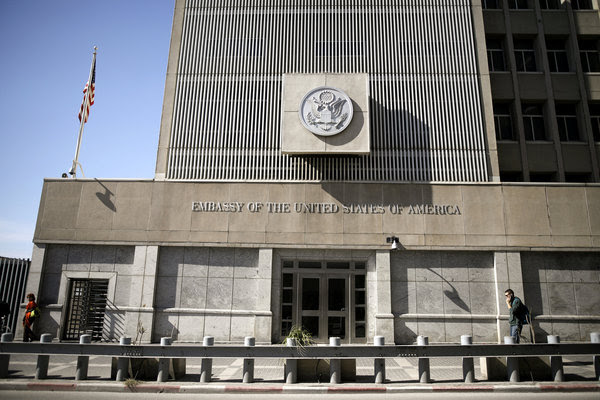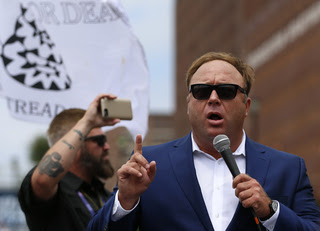
The front of the U.S. embassy in Tel Aviv. (Amir Cohen/Reuters)
No, not that one
Before his inauguration, President Trump suggested that one of the first things he would do after taking office would be to move the U.S. embassy in Israel from Tel Aviv to Jerusalem. As of yet, the move hasn't happened.
It's not totally clear why, but it seems likely that Trump may have followed the advice of former U.S. diplomats and Arab leaders who warned that the move would infuriate Palestinians and could lead to violence. Many on the Israeli right — and the American right, too — are annoyed by the quiet change.
But just a few months later, it looks like an embassy may be moving to Jerusalem after all. It just may not be American.
The Russian Foreign Ministry released a statement on Thursday that said Moscow viewed "West Jerusalem as the capital of Israel." The statement appeared to mark a change in policy: Russia had previously said Jerusalem should be under international control.
It was a surprising move, and no one seems to know what prompted it. Eugene Kontorovich, a law professor and expert of the Arab-Israeli conflict, wrote on Twitter that Moscow may be responding to America's slow moves on the issue. The Russian decision "stole [Trump's] thunder," Kontorovich wrote.
The Israeli government itself appeared totally unprepared for the announcement. Officials could offer little comment to reporters, suggesting they weren't quite sure what to make of the situation.
“We are studying the matter,” said Foreign Ministry spokesman Emmanuel Nahshon to the Times of Israel.
Whether the announcement is symbolic or not remains to be seen. The Jerusalem Post reports that the recognition of West Jerusalem as Israel's capital would "go into effect immediately" — but also that there is currently no intention of actually moving the Russian embassy. One Israeli official told the Jerusalem Post they suspect the move was announced to "deflect criticism" of Moscow's ties to Syrian President Bashar al-Assad.
Either way, Russia and Israel have been pursuing a closer relationship recently. Israeli Prime Minister Benjamin Netanyahu traveled to Moscow last month to meet with Vladimir Putin, and neither country wants to see rebel or jihadist groups win the war in Syria. And with the U.S. suddenly making noises about getting tough on the Assad regime, Putin may soon need other allies in the Middle East. — Adam Taylor

Senate Majority Leader Mitch McConnell (R-Ky.) walks towards the Senate chamber on April 6. (Alex Wong/Getty Images)
The big question
On Thursday, Senate Republicans voted to end the use of the filibuster on Supreme Court nominations, a move nicknamed "the nuclear option." Previously, a group of 41 senators could block a nomination from moving forward, which is what happened this week when Senate Democrats decided to filibuster conservative Judge Neil Gorsuch's nomination to the court. The move means Gorsuch will soon be confirmed, but pundits, politicians and even Republicans who voted for the rule change claim the end of the judicial filibuster is a dramatic and negative change for the Senate. So we we asked James Hohmann, a Post national political correspondent and the author of our sister newsletter, the Daily 202: Why is the "nuclear option" potentially dangerous for American democracy?
"The Senate is careening down a slippery slope.
"For now, senators still agree that 60 votes should be required to break filibusters on actual bills, covering things like health care and tax reform. But both parties are becoming more and more beholden to their bases of support. Now that McConnell has loosened the rules for judicial nominees, he is certain to face intensifying pressure from conservative activists — and the White House — to do it again for legislation.
"McConnell claims he can and will resist that pressure, but historians, political scientists and several senators on both sides think today’s move makes the change inevitable. And everyone agrees that would allow unworthy legislation to become law.
"The Senate was designed to make it hard for narrow majorities to force their will on everyone else. The unruly, directly elected House of Representative might pass partisan bills, but the upper chamber — whose members were chosen by state legislatures until 1914 — was where legislation got a second reading by a more mature body and smaller states were given enough clout to protect their interests.
"This is a feature, not a bug, of our system. Without the unique bicameral configuration, the Constitution might not have survived for 230 years.
"Rule changes have often seemed like good ideas. In 1975, Democratic Senator Walter Mondale negotiated a deal to reduce the filibuster threshold from 66 votes to 60 votes, in part because he wanted to make it easier to pass civil rights legislation.
"But more changes may turn out worse for Republicans in the long run. After all, the right does not want to pass sweeping laws that expand the government. Yet if Democrats regain the majority and the legislative filibuster is gone, they'll be able to raise taxes, jack up the minimum wage, create universal health coverage and enact other liberal policy priorities — with the GOP powerless to stop them." |


 In Russia, the mourning for the victims of Monday's metro bombing in St. Petersburg is far from over. Russians held memorial rallies like this one in cities across the country — though some analysts suspect they were organized by the government in an implicit response to anti-corruption rallies that took place last week. Indeed, when one Moscow demonstrator held up a sign that read "Corruption Kills" — terrorists in Russia were able to evade capture because police are corrupt, he argued — policemen quickly arrived and told him to lower it. (Olga MaltsevaAFP/Getty Images)
In Russia, the mourning for the victims of Monday's metro bombing in St. Petersburg is far from over. Russians held memorial rallies like this one in cities across the country — though some analysts suspect they were organized by the government in an implicit response to anti-corruption rallies that took place last week. Indeed, when one Moscow demonstrator held up a sign that read "Corruption Kills" — terrorists in Russia were able to evade capture because police are corrupt, he argued — policemen quickly arrived and told him to lower it. (Olga MaltsevaAFP/Getty Images)



























No comments:
Post a Comment